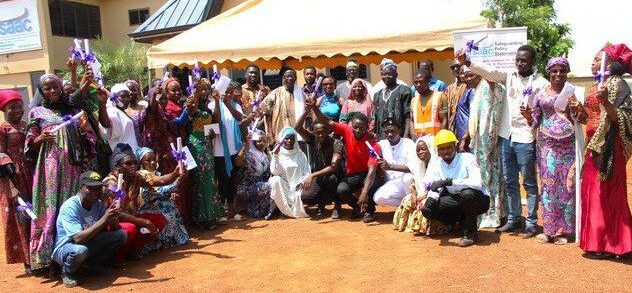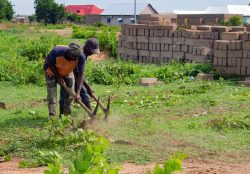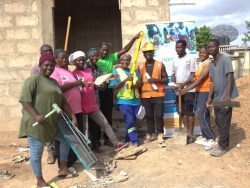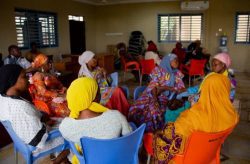


In Tamale, Northern Ghana, trainees have completed their practical skills and business training with our project partner, NORSAAC. The trainees attended a vibrant graduation ceremony to celebrate the first half of their training journey.
The event brought together traditional leaders, government officials, civil society partners, trainers and family members to honour the achievements of the young artisans.
Each graduate was awarded two certificates: one for the practical upskills training in their respective trade, and another for the business management training. These certificates not only serve as a testament to their hard work and commitment, but also enhance their credibility and employability in the local market.
In addition, each graduate received a trade specific tool kit, ensuring that as they enter the second half of the project, they are equipped with the skills and tools they need for successful working futures.
The Business Development for Youth Artisans project with NORSAAC began in February 2025 to upskill representatives from 30 business enterprises and enhance their income generation and entrepreneurial capacity. 15 tailors joined the project, alongside 5 individuals engaged in building and construction, and 10 individuals pursuing tiling and bricklaying. Trainees took time out from their day-to-day business commitments to complete 5 days of intensive, practical upskilling sessions tailored to their trades and individual needs.

Tailoring trainee Mohammed Rashida wears a Corset Dress
Training sessions for each trade were carried out at the Trainers’ own workshops or job sites. This allowed trainees engage in hands-on learning with a range of materials and equipment relevant to their trades, use professional tools under supervision, and experience real work site conditions.
Tailoring trainees have learned:
• measurement techniques essential for garment construction
• pattern drafting and cutting techniques
• constructing techniques for collars, bras and bustiers
• hip pad construction and corset dress making
• beading, embellishments, and the creative re-use of tailoring waste
Trainees were provided with fabric to complete take-home assignments in pattern drafting and garment construction. The training culminated with a lively photo session where the tailors showcased the garments they had made, which included a hip pad skirt, corset bodice and hand-painted dress.
The trainees were so committed to learning that many willingly extended their daily participation beyond the scheduled hours, to ensure they fully grasped the skills being taught. Tailoring trainee, Mohammed Kusumi, said: “I wished we could stay and practice till sunset, it feels so exciting to finally understand and do things I used to struggle with. I can’t believe there is so much more to tailoring than what I know.”
Building and Construction participants were introduced to:
• fundamentals of building foundations and the importance of soil type and excavation techniques
• measurement techniques and interpretation of architectural symbols and floor plans
• concrete and mortar mixtures and the use of masonry tools
• block laying and plastering techniques
• screeding and levelling, site safety and personal protective equipment

Construction trainees practice Plan Layout and Setting
The trainees laid out a mock structure based on a sample blueprint, poured foundation blocks, constructed a half-wall and a full corner wall section, applied plaster, demonstrated blockwork and screeded a floor section.
Trainee, Abdul Mumin Shuaib, told us: “My confidence in interpreting plans has improved tremendously and I noticed that my customers have also noticed as I have been receiving compliments and tips for work done”

Trainees after their practical training session in Tiling
Bricklaying and Tiling training included:
• jobsite safety protocols and the use of personal protective equipment
• introduction to essential tools, materials, and surface preparation and treatments
• blueprint interpretation and measurements, marking layouts, dry fitting and creating tile patterns
• installation techniques, sealing and grouting
• specialized applications, repair techniques
• business skills including costing, client communication, and certification pathways
Bricklaying and Tiling trainees were assessed through a mix of group challenges and individual tasks. A layout competition encouraged teamwork and precision, while a dry-fitting session allowed for alignment checks and feedback. Each artisan tiled and grouted a mock wall and were tasked with costing exercise based on a sample room plan.
A 2-day training workshop covered foundational business management skills that would enable trainees to operate their businesses more effectively and sustainably. Topics covered included:
• basic financial literacy concepts,
• developing practical business plans
• best practices in inventory management
• customer care strategies to enhance client satisfaction,
• techniques for improving bargaining power,
• How to stay responsive to evolving market trends,
• How to access to responsibly access credit and manage financial resources.

Business Management training session
Through a mix of discussions, role-play, case studies, and hands-on exercises, participants gained a deeper understanding of business management concepts and were encouraged to reflect on their own experiences and share solutions with their peers. Tiling trainee, Abdul Mumin Abdul Nasir, said: “I have been a tiler for years now but never knew I was lacking so much until I joined this project. I opened my eyes to see that there is more to business than just knowing a skill. I have learned so much and I am grateful for the opportunity given.”
The first half of this project has equipped trainees with practical, market-relevant skills that enhance their productivity and income-generating potential. The experience of training in real work sites will help participants bridge the gap between training and employment, giving artisans the confidence to take on client projects independently.
Over the next 6 months, graduates will receive continuous business development support and mentorship from the Norsaac team, including help with financial strategies to ensure sustainable impact and inclusive growth. Each graduate will receive a business grant to help further their business. Mentors will follow-up to see how the graduates are making changes to the way they work and run their businesses, and to provide troubleshooting support if they are having any issues.
Speaking at the graduation ceremony, the Traditional Chief made a powerful call to action for graduates. He urged the graduates to make the most of the ongoing training opportunity and expressed his hope to return next year to celebrate their progress. Graduate, Mohammed Kusimi, addressed the congregation and said: “We are so grateful to be part of this project and thankful for all the knowledge imparted to us. On behalf of my colleagues and I, we assure [you that] we won’t let you down. We will make use of the skills and grants, and also share the knowledge acquired with our apprentices and youth business groups we are affiliated with.”
We can’t wait to follow the progress of our graduates as they complete the final months of their training journey.
Projects such as these would not be possible without you. If you would like to support our life-changing projects, please click here to give a one-off gift or set up a regular donation. Thank you.
August 2025